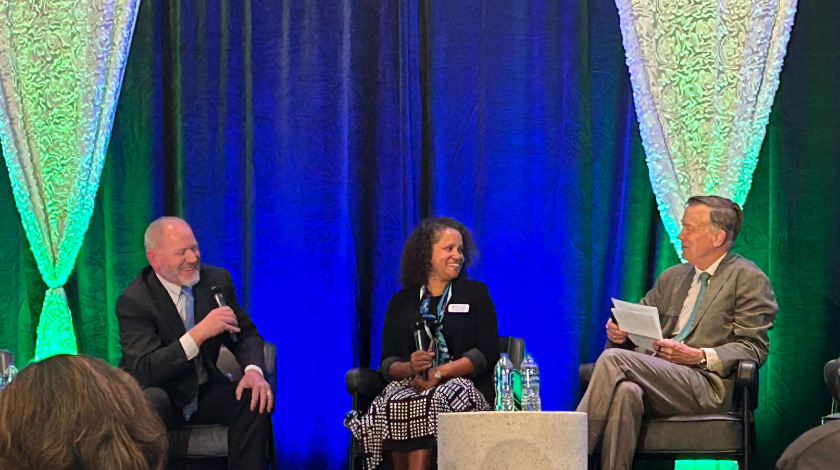Drew Clark, Broadband Breakfast Editor and Publisher; Brandy Reitter, Colorado Broadband Office Executive Director; and Senator John Hickelooper, former Governor of Colorado during Mountain Connect 2023
By Cristal Mojica
The recent Mountain Connect 2023 broadband development conference brought together communities, counties, school districts, healthcare providers, utilities and cable operators, state and federal governmental entities, and emerging technology companies from across the nation. Held in Denver, August 7 – 9, 2023, the conference aimed to foster the cross-state conversations and collaboration that will be needed to successfully realize the goals of the federal Broadband Equity, Access and Deployment (BEAD) program.
Over the course of three days, the sessions included everything from the basics of broadband technology, community broadband case studies, community development, panels with State Broadband Offices, to research on the implications of existing broadband policy on the urban-rural divide. In addition to voices from California and Colorado, the digital equity conversations also included representatives from Arizona, Idaho, Illinois, Kansas, Louisiana, Mississippi, New Mexico, South Dakota, Utah, and Virginia.
One highlight from the conference was Governor Jared Polis’ lunch address, in which he shared Colorado’s goal to connect 99% of the state’s homes by 2027 while emphasizing his commitment to collaboration across agencies and states to achieve it with BEAD funding. California will receive $1.86 billion from the BEAD program for its own connectivity goals, with Colorado comparatively securing $826 million.
The Broadband After BEAD session, presented by telecommunications Professor Christopher Ali, looked at the larger social, political, and economic inequalities that exist regardless of funding and called for federal, state, and local leaders to plan beyond the BEAD program for affordability, access, and training. The presentation emphasized approaching this work through the lens of economic sustainability, climate sustainability and resiliency, redundancy, network experimentation, and the renewal of the Affordable Connectivity Program.
Dr. Ali also shared future opportunities and challenges in broadband policy, highlighting examples from states currently providing model legislation. He referenced California’s Assembly Bill 41 (Wood, 2021), which required the Department of Transportation, as part of projects that are funded by a specified item of the Budget Act of 2021 and that are located in priority areas, to ensure that construction includes the installation of conduits capable of supporting fiber optic communication cables.
At the conclusion of the conference, attendees of Mountain Connect 2023 returned to their home states with these key takeaways:
- Broadband development is a great opportunity to find common ground across political and geographic divides—the rural and urban divide does not need to exist when it comes to connectivity for all.
- In order to build sustainably, communities should not only solve for sufficient funding, but also for human capital. Identify the people embedded in and knowledgeable about the community who will carry on the work long-term.
- A county or municipality’s most important early investment is a thorough feasibility study.his will help accurately identify potential building challenges and help assess how to best leverage existing infrastructure assets within a community to reduce overall cost. This includes looking at the age, materials, dimensions, and maintenance of the existing infrastructure.
- There is a great need for connecting communities to potential providers when building new infrastructure. There is currently no clear pathway for fostering these relationships and for assessing all viable partnerships.
- Involving all potential community partners in planning conversations early on is essential to ensuring that there aren’t missed opportunities to stretch combined resources.his is particularly important when intending to partner with tribal communities where last mile connectivity is especially challenging.
- Understanding your local and state digital equity ecosystem, and power-mapping stakeholders and allies, is essential to effectively navigating the challenges of closing the digital divide. This includes identifying where the gaps are in the ecosystem to take the necessary steps to fill them.
We were inspired by Mountain Connect 2023 and look forward to seeing future cross-state collaboration.
Michelson 20MM is a private, nonprofit foundation working toward equity for underserved and historically underrepresented communities by expanding access to educational and employment opportunities, increasing affordability of educational programs, and ensuring the necessary supports are in place for individuals to thrive. To do so, we work in the following verticals: Digital Equity, Intellectual Property, Smart Justice, Student Basic Needs, and Open Educational Resources (OER). Co-chaired and funded by Alya and Gary Michelson, Michelson 20MM is part of the Michelson Philanthropies network of foundations.
To sign up for our newsletter, click here.
